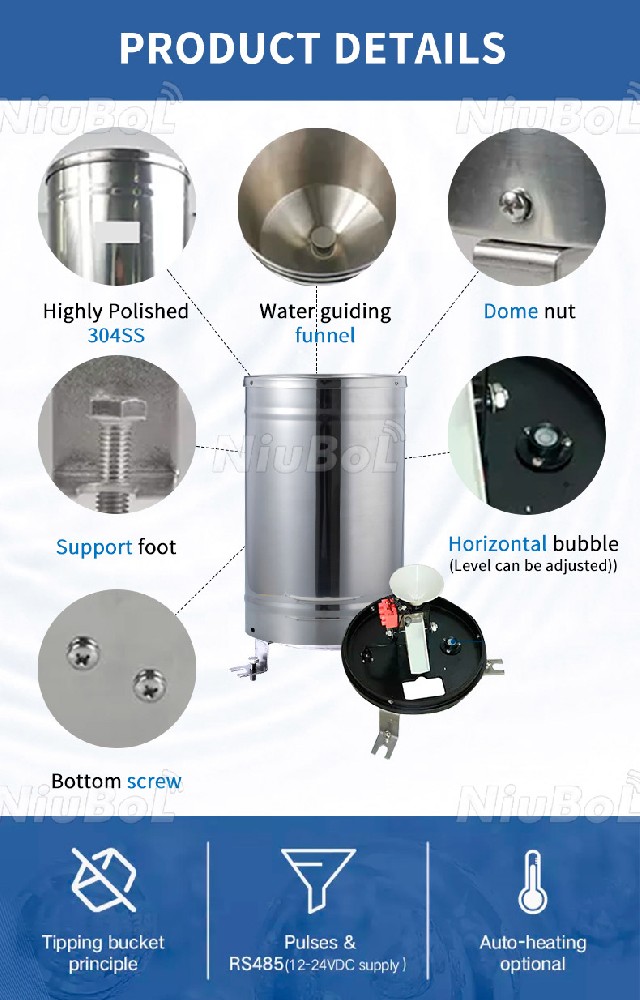

— Blogs —
—Products—
 Consumer hotline +8618073152920
Consumer hotline +8618073152920 WhatsApp:+8615367865107
Address:Room 102, District D, Houhu Industrial Park, Yuelu District, Changsha City, Hunan Province, China
Technical Support
Time:2024-04-14 15:07:24 Popularity:725
INTRODUCTION
Rainfall is an important meteorological parameter in agricultural cultivation, building construction, weather observation and other industries, and accurate observation of rainfall is crucial. The rain gauge is an outdoor instrument that operates for a long time, and its accuracy and stability are crucial for meteorological observation. Regular maintenance and upkeep of rain gauges not only prolongs the service life, but also ensures the accuracy and reliability of the data. This article will introduce the rain gauge routine maintenance and maintenance methods to help users keep the instrument in the best working condition.
Composition of tipping bucket rain gauge
The tipping bucket rain gauge consists of rain gauge shell, rain collector, funnel, tipping bucket support, tipping bucket, bearing screws, water outlet bin, sealing connector, reed switch, leveling bubble, adjusting the support plate, control box, leveling device, terminals, leg braces, the base of the rain gauge and other components. Among them, the base of the rain gauge is installed with the tipping bucket shaft, round horizontal bubble, reed switch bracket and signal output terminal.
Principle of tipping bucket rain gauge
The working principle of the tipping bucket rain gauge is: rainwater from the uppermost rain bearing mouth into the water bearer, falling into the water diversion funnel, through the funnel mouth into the tipping bucket, when the amount of accumulated water reaches a certain height (for example, 0.1mm or 0.2mm millimeters), the tipping bucket loses its balance and tumbles over; pouring out the water, with the rainfall continues to make the tipping bucket left and right flip, the contact switch will turn the tipping bucket flip number of times into an electrical signal, sent to the logger, the cumulative counter and the self-timer clock on the signal output terminal. The contact switch turns the number of times the bucket is turned over into an electrical signal and sends it to the recorder, which reads out the precipitation data on the cumulative counter and the self-logging clock, and so on and so forth to measure the rainfall process.
Daily maintenance tipping bucket rain gauge
1.Keeping the rain-bearing mouth clean: regularly wipe the inner wall of the rain-bearing mouth with a soft cloth, remove leaves and other foreign objects to keep the waterway smooth.
2.Check the level: Observe the position of the level bubble, if it is not in the center circle, use a small wrench to adjust the level screw.
3.Dustproof and anti-clogging: For rain gauges that are not used for a long time, the cover should be added to protect the rain-bearing mouth.

Cleaning the tumbler
Clean the tumbler regularly to remove dust and oil from the inner wall. It can be rinsed with water or gently brushed with a degreasing brush, and it is strictly prohibited to touch or scrape with hard objects.
Regular Inspection
1.Generally conduct a comprehensive inspection and cleaning once a month.
2.Before encountering heavy precipitation, calibration should be carried out to ensure the accuracy of measurement.
3.Ensure that the outer barrel is firmly vertical as well as the level of the water container to prevent deformation of the mouth of the water container. If the outer barrel is not stable, it will shake when the wind is strong, thus damaging the instrument, while whether the outer barrel is vertical and whether the water bearer is horizontal and vertical is directly related to the objectivity of the rain collector.
Conclusion
Accurate observation of rain gauge depends on careful maintenance and care. Users should carry out regular daily inspection and cleaning to ensure that the rain gauge is always in good working condition. Through careful maintenance, we can effectively improve the timeliness and accuracy of data transmission and provide reliable rainfall data support for various applications.
Related recommendations
Sensors & Weather Stations Catalog
Agriculture Sensors and Weather Stations Catalog-NiuBoL.pdf
Weather Stations Catalog-NiuBoL.pdf
Related products
 Combined air temperature and relative humidity sensor
Combined air temperature and relative humidity sensor Soil Moisture Temperature sensor for irrigation
Soil Moisture Temperature sensor for irrigation Soil pH sensor RS485 soil Testing instrument soil ph meter for agriculture
Soil pH sensor RS485 soil Testing instrument soil ph meter for agriculture Wind Speed sensor Output Modbus/RS485/Analog/0-5V/4-20mA
Wind Speed sensor Output Modbus/RS485/Analog/0-5V/4-20mA Tipping bucket rain gauge for weather monitoring auto rainfall sensor RS485/Outdoor/stainless steel
Tipping bucket rain gauge for weather monitoring auto rainfall sensor RS485/Outdoor/stainless steel Pyranometer Solar Radiation Sensor 4-20mA/RS485
Pyranometer Solar Radiation Sensor 4-20mA/RS485
Screenshot, WhatsApp to identify the QR code
WhatsApp number:+8615367865107
(Click on WhatsApp to copy and add friends)